华夏大地 高伟主讲 自考英语二重点班讲义
- 格式:doc
- 大小:320.00 KB
- 文档页数:48
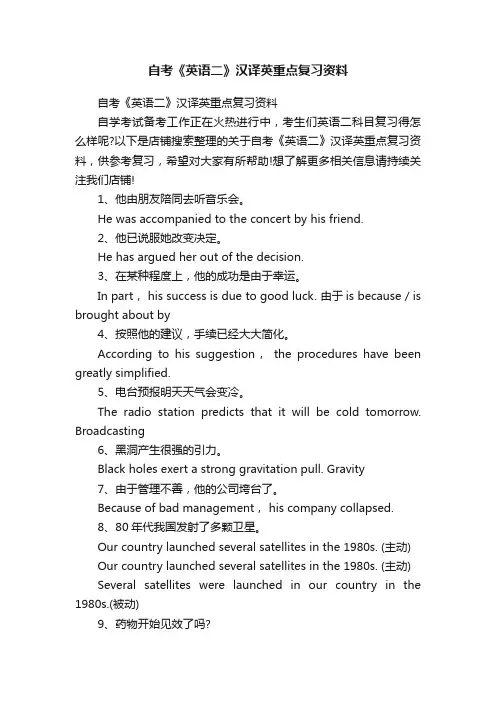
自考《英语二》汉译英重点复习资料自考《英语二》汉译英重点复习资料自学考试备考工作正在火热进行中,考生们英语二科目复习得怎么样呢?以下是店铺搜索整理的关于自考《英语二》汉译英重点复习资料,供参考复习,希望对大家有所帮助!想了解更多相关信息请持续关注我们店铺!1、他由朋友陪同去听音乐会。
He was accompanied to the concert by his friend.2、他已说服她改变决定。
He has argued her out of the decision.3、在某种程度上,他的成功是由于幸运。
In part, his success is due to good luck. 由于is because / is brought about by4、按照他的建议,手续已经大大简化。
According to his suggestion,the procedures have been greatly simplified.5、电台预报明天天气会变冷。
The radio station predicts that it will be cold tomorrow. Broadcasting6、黑洞产生很强的引力。
Black holes exert a strong gravitation pull. Gravity7、由于管理不善,他的公司垮台了。
Because of bad management, his company collapsed.8、80年代我国发射了多颗卫星。
Our country launched several satellites in the 1980s. (主动) Our country launched several satellites in the 1980s. (主动) Several satellites were launched in our country in the 1980s.(被动)9、药物开始见效了吗?Has the medicine begun to operate?10、如果我们认识了黑洞,黑洞就不那么可怕了。
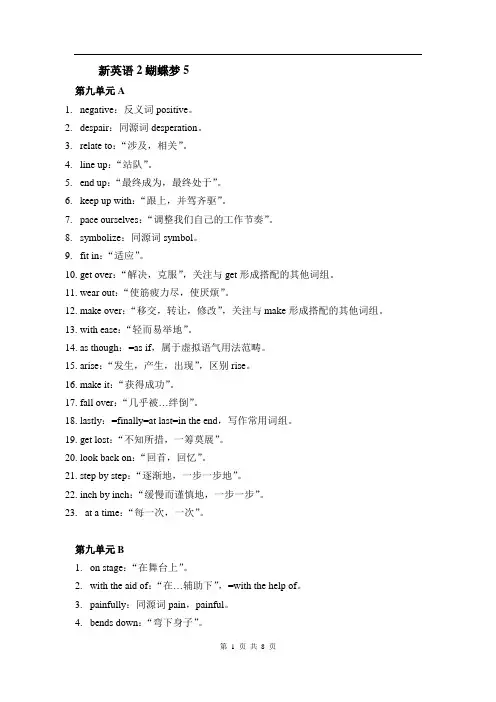
新英语2蝴蝶梦5第九单元A1.negative:反义词positive。
2.despair:同源词desperation。
3.relate to:“涉及,相关”。
4.line up:“站队”。
5.end up:“最终成为,最终处于”。
6.keep up with:“跟上,并驾齐驱”。
7.pace ourselves:“调整我们自己的工作节奏”。
8.symbolize:同源词symbol。
9.fit in:“适应”。
10.get over:“解决,克服”,关注与get形成搭配的其他词组。
11.wear out:“使筋疲力尽,使厌烦”。
12.make over:“移交,转让,修改”,关注与make形成搭配的其他词组。
13.with ease:“轻而易举地”。
14.as though:=as if,属于虚拟语气用法范畴。
15.arise:“发生,产生,出现”,区别rise。
16.make it:“获得成功”。
17.fall over:“几乎被…绊倒”。
stly:=finally=at last=in the end,写作常用词组。
19.get lost:“不知所措,一筹莫展”。
20.look back on:“回首,回忆”。
21.step by step:“逐渐地,一步一步地”。
22.inch by inch:“缓慢而谨慎地,一步一步”。
23.at a time:“每一次,一次”。
第九单元B1.on stage:“在舞台上”。
2.with the aid of:“在…辅助下”,=with the help of。
3.painfully:同源词pain,painful。
4.bends down:“弯下身子”。
5.pick up:“拾起,捡起”。
6.be used to:“现在已经习惯于”,区别used to do。
7.makes one’s way:“去,前往”。
8.reverently:同源词reverent。
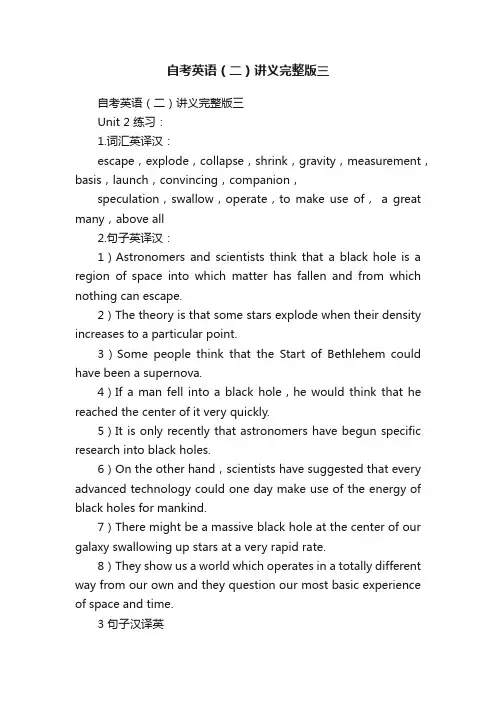
自考英语(二)讲义完整版三自考英语(二)讲义完整版三Unit 2 练习:1.词汇英译汉:escape,explode,collapse,shrink,gravity,measurement,basis,launch,convincing,companion,speculation,swallow,operate,to make use of,a great many,above all2.句子英译汉:1)Astronomers and scientists think that a black hole is a region of space into which matter has fallen and from which nothing can escape.2)The theory is that some stars explode when their density increases to a particular point.3)Some people think that the Start of Bethlehem could have been a supernova.4)If a man fell into a black hole,he would think that he reached the center of it very quickly.5)It is only recently that astronomers have begun specific research into black holes.6)On the other hand,scientists have suggested that every advanced technology could one day make use of the energy of black holes for mankind.7)There might be a massive black hole at the center of our galaxy swallowing up stars at a very rapid rate.8)They show us a world which operates in a totally different way from our own and they question our most basic experience of space and time.3 句子汉译英黑洞是什么,天文学家还没有完全解决这个问题。
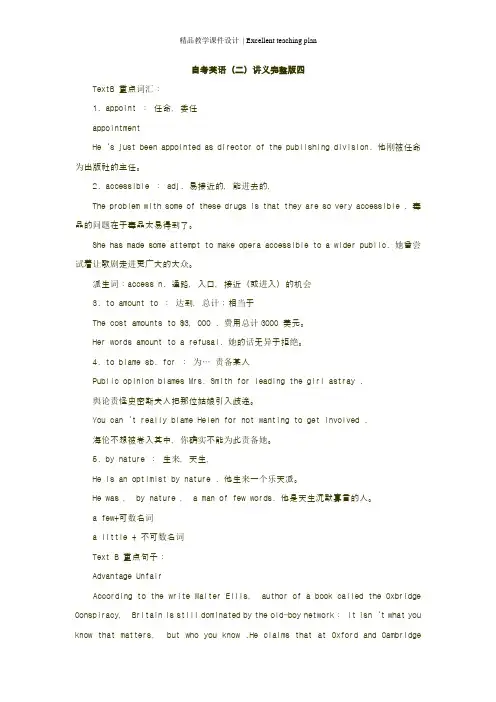
自考英语(二)讲义完整版四TextB 重点词汇:1. appoint :任命,委任appointmentHe‘s just been appointed as director of the publishing division. 他刚被任命为出版社的主任。
2. accessible : adj. 易接近的,能进去的,The problem with some of these drugs is that they are so very accessible . 毒品的问题在于毒品太易得到了。
She has made some attempt to make opera accessible to a wider public. 她曾尝试着让歌剧走进更广大的大众。
派生词:access n. 通路,入口,接近(或进入)的机会3. to amount to :达到,总计;相当于The cost amounts to $3,000 . 费用总计3000 美元。
Her words amount to a refusal. 她的话无异于拒绝。
4. to blame sb. for :为…责备某人Public opinion blames Mrs. Smith for leading the girl astray .舆论责怪史密斯夫人把那位姑娘引入歧途。
You can‘t really blame Helen for not wanting to get involved .海伦不想被卷入其中,你确实不能为此责备她。
5. by nature :生来,天生,He is an optimist by nature . 他生来一个乐天派。
He was , by nature , a man of few words. 他是天生沉默寡言的人。
a few+可数名词a little + 不可数名词Text B 重点句子:Advantage UnfairAccording to the write Walter Ellis, author of a book called the Oxbridge Conspiracy, Britain is still dominated by the old-boy network: it isn‘t what you know that matters, but who you know .He claims that at Oxford and CambridgeUniversities (Oxbridge for short) a few select people start on an escalator ride which, over the years, carries them to the tops of British privilege and power. His research revealed that the top professions all continue to be dominated, if not 90 percent, then 60 or 65per cent, by Oxbridge graduates.And yet, says Ellis, Oxbridge graduates make up only two percent of the total number of students who graduate from Britain‘s universities. Other researches also seem to support his belief that Oxbridge graduates start with an unfair advantage in the employment market. In the law, a recently published report showed that out of 26 senior judges appointed to the High Court last year ,all of them went to private schools and 21 of them went to Oxbridge.But can this be said to amount to a conspiracy? Not according to Dr.John Rae,a former headmaster of one of Britain‘s leading private school ,Westminster:“I would accept that there was a bias in some key areas of British life , but that bias has now gone .Some time ago-in the 60s and before -entry to Oxford and Cambridge was not entirely on merit .Now, there‘s absolutely no question in any objective obser ver’s mind that entry to Oxford and Cambridge is fiercely competitive.”However many would disagree with this. For, although over three-quarters of British pupils are educated in state schools, over half the students that go to Oxbridge have been to private, over half the students that go to Oxbridge have been to private, or “public” school .Is this because pupils from Britain‘s private schools are more intelligent than those from state schools, or are they simply better prepared?On average ,about £5,000 a year is spent on each private school pupil, more than twice the amount spent on state school pupils .So how can the state schools be expected to compete with the private schools when they have far fewer resources?And how can they prepare their pupils for the special entrance exam to Oxford University, which requires extra preparation, and for which many public school pupils traditionally stay at school and do an additional term ?Until recently, many blamed Oxford for this bias because of the university‘s special entrance exam (Cam bridge abolished its entrance exam in 1986) But last February ,Oxford University decided to abolish the exam to encourage more state school applicants .From autumn 1996, Oxford University applicants, like applicants to other universities , will be judged only on their A level results and on their performance at interviews , although some departments might still set special tests.However, some argue that there‘s nothing wrong in having elite laces of learning ,and by their very nature ,these places should not be easily accessible. Most countries are run by an elite and have centers of academic excellence from which the elite are recruited. Walter Ellis accepts that this is true:“But in France, for example, there are something like 40equivalents of university, which provide this elite through a much broader base ,In America you ‘ve got the Ivy League, centred on Harvard and Yale .with Princeton ad Stanford and others. But again, those universities together-the elite universities-are about ten or fifteen in number ,and are being pushed aling from behind by other great universities like ,for example, Chicago and Berkeley, So you don’t have just this narrow concentration of two universities providing a constantly replicating elite.”When it comes to Oxford and Cambridge being elitist becarse orf he number of private school pupils they accept , Professor Stone of Oxford University argues that there is a simple fact he and his associates cannot ignore:“If certain schools so better than others then we just have to accept it . We cannot be a place for remedial education. It‘s not what Ocford is there to do .”However, since academic excellence does appear to be related to the amount of money spent per pupil ,this does seem to imply that Prime Minister John Major ‘s vision of Britain as a classless society is still a long way off. And it may be worth rememberin g that while John Major didn’t himself go to Oxbridge most of his ministers did.1. Britain is still dominated by the old- boy network; it isn‘t what you know that matters, but who you know.强调句,不是你懂得知识重要,而是你认识谁重要2. He claims that at Oxford and Cambridge Universities (Oxbridge for short)a few select people start on an escalator ride which, over the years, carries them to the tops of British privilege and power. 比喻少数精选出来的人,进了牛津或剑桥,就像坐上了电梯一样,很快就会爬上英国权力的顶峰。
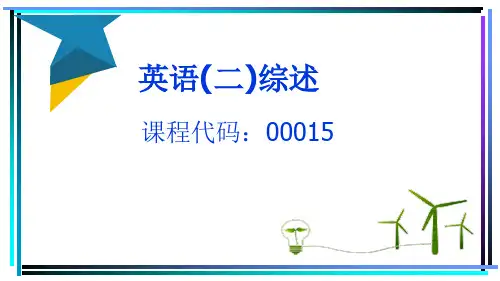
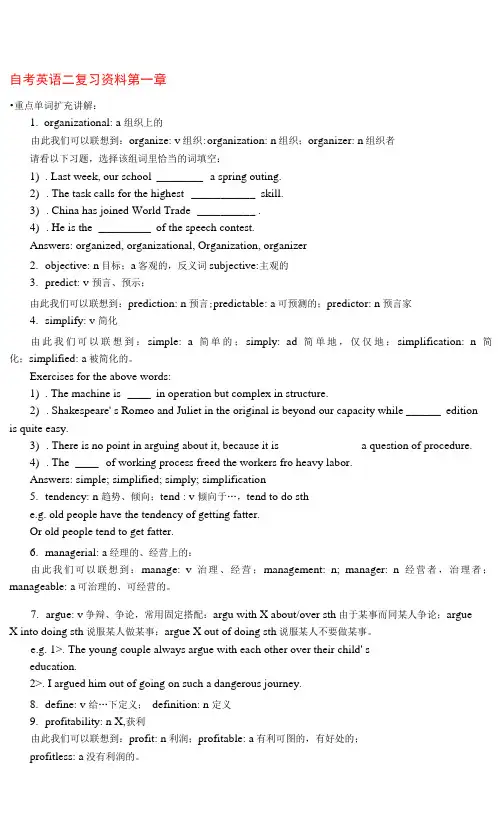
自考英语二复习资料第一章•重点单词扩充讲解:anizational: a 组织上的由此我们可以联想到:organize: v组织:organization: n组织;organizer: n组织者请看以下习题,选择该组词里恰当的词填空:1). Last week, our school ________ a spring outing.2). The task calls for the highest ___________ skill.3). China has joined World Trade __________ .4). He is the _________ of the speech contest.Answers: organized, organizational, Organization, organizer2.objective: n目标;a客观的,反义词subjective:主观的3.predict: v 预言、预示;由此我们可以联想到:prediction: n预言;predictable: a可预测的;predictor: n预言家4.simplify: v 简化由此我们可以联想到:simple: a简单的;simply: ad简单地,仅仅地;simplification: n简化;simplified: a被简化的。
Exercises for the above words:1). The machine is ____ in operation but complex in structure.2). Shakespeare' s Romeo and Juliet in the original is beyond our capacity while ______ edition is quite easy.3). There is no point in arguing about it, because it is a question of procedure.4). The ____ of working process freed the workers fro heavy labor.Answers: simple; simplified; simply; simplification5.tendency: n 趋势、倾向;tend : v 倾向于…,tend to do sthe.g. old people have the tendency of getting fatter.Or old people tend to get fatter.6.managerial: a经理的、经营上的:由此我们可以联想到:manage: v治理、经营;management: n; manager: n经营者,治理者;manageable: a可治理的、可经营的。
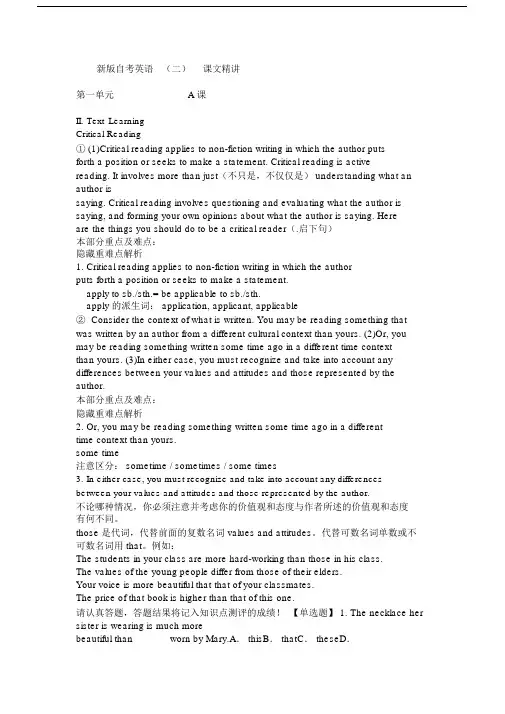
新版自考英语(二)课文精讲第一单元 A 课II.Text LearningCritical Reading① (1)Critical reading applies to non-fiction writing in which the author putsforth a position or seeks to make a statement. Critical reading is activereading. It involves more than just(不只是,不仅仅是) understanding what an author issaying. Critical reading involves questioning and evaluating what the author is saying, and forming your own opinions about what the author is saying. Hereare the things you should do to be a critical reader(.启下句)本部分重点及难点:隐藏重难点解析1. Critical reading applies to non-fiction writing in which the authorputs forth a position or seeks to make a statement.apply to sb./sth.= be applicable to sb./sth.apply 的派生词: application, applicant, applicable②Consider the context of what is written. You may be reading something that was written by an author from a different cultural context than yours. (2)Or, you may be reading something written some time ago in a different time contextthan yours. (3)In either case, you must recognize and take into account any differences between your values and attitudes and those represented by the author.本部分重点及难点:隐藏重难点解析2.Or, you may be reading something written some time ago in a differenttime context than yours.some time注意区分: sometime / sometimes / some times3.In either case, you must recognize and take into account any differences between your values and attitudes and those represented by the author.不论哪种情况,你必须注意并考虑你的价值观和态度与作者所述的价值观和态度有何不同。
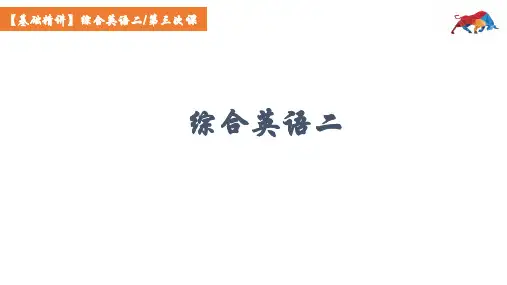
综合英语二1.基础较薄弱的同学建议买书,书分为上下两册。
2. 书的版本:2000版 3.买书怎么学:a. 打印《综合英语二课文翻译》——在精讲1课件下载处,对照着中文将书完整精读一遍 b. 书本上有每一课生词,两天一课,将其掌握 c. 课文后有难点句子解析和语法整理,比较详细,可以对照着看,对巩固基础非常有帮助。
4. 不买书怎么学:1. 打印《综合英语二课文翻译》,对照中文把课文精读一遍,尤其是难点句子多看两遍。
2. 《通关宝典》中的语法知识可以先自己系统的看一看。
3. 《通关宝典》后面有每一课难点句子,可以对照着难点句子看课文和翻译 4. 自己下载背单词APP或者买四级单词书,每天至少背30个生词考题模块(一) Word Derivation 词性转换V. WORD DERIVATIONComplete each of the following sentences with a (compound复合的) word derived from the one(s) given in brackets. Write your word on the answer sheet. (1 point each, 10 points in all)用所给单词的适当形式补充句子。
什么是词形变换?1.四大词性 n. adj. adv. v 之间的相互转换powern.权力 powerful adj.强有力的empowerv.授予,允许什么是词形变换?1.四大词性 n. adj. adv. v 之间的相互转换2. 肯定 否定dislikelike1. When you feel bad, find a person to cry with and to let out your anger and other feelings of ______ (hopeless)【2016年4月】1. When you feel bad, find a person to cry with and to let out your anger and other feelings of ______ (hopeless)【2016年4月】hopehopefulhopefulnesshopelessness1. When you feel bad, find a person to cry with and to let out your anger and other feelings of ______ (hopeless)hope预设答案hopefulhopefulnesshopelessness词形变换做题步骤:1. 预设答案2. 判断空缺处词性3.根据句意选出正确答案2. This is an example of a ________ application of the principles.(create)creative adj.有创造力的creation n.创造2. This is an example of a creative application of the principles.(create)3. The will to win and the desire to succeed are the keys that will unlock the door to _____________ excellence. ( person)personal adj. 个人的personality n. 个性personnel n.员工,人事部门;adj.员工的,有关人事的3. The will to win and the desire to succeed are the keys that will unlock the door to personal excellence. ( person)4. H e believed in________so much that he would rather die than live without it. (free)4. H e believed in freedom so much that he would rather die than live without it. (free)5. We all know that ________ is the first re q uirement for learning. (concentrate)5. We all know that concentration is the first re q uirement for learning. (concentrate)6. Please concentrate on the business at hand and don’t drag in__________ issues. (relevant)relevance n.相关性irrelevant adj.不相干的6. Please concentrate on the business at hand and don’t drag in irrelevant issues. (relevant)考虑变否定7. In my opinion it is less____________ for a king to be overcome by force of arms than by bribery. (shame)A. shamefulB. shameless7. In my opinion it is less shameful for a king to be overcome by force of arms than by bribery【贿赂,受贿】. (shame)在我看来,国王由于受贿下台比被武力推翻更为可耻。
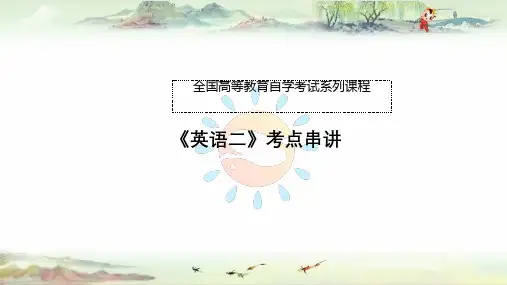
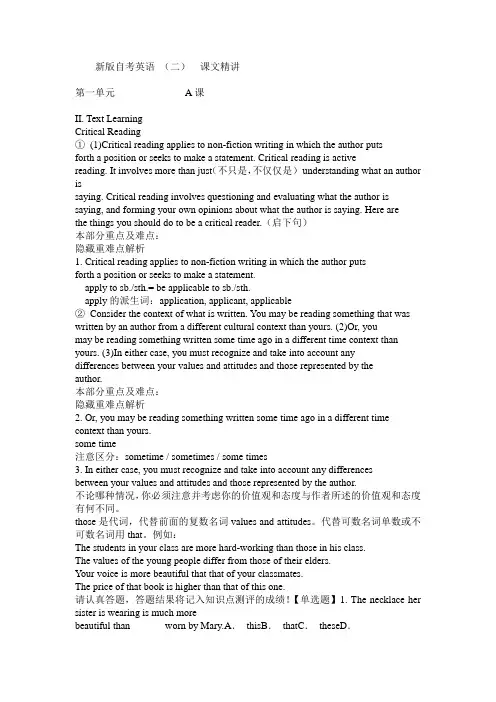
新版自考英语(二)课文精讲第一单元A课II. Text LearningCritical Reading①(1)Critical reading applies to non-fiction writing in which the author putsforth a position or seeks to make a statement. Critical reading is activereading. It involves more than just(不只是,不仅仅是)understanding what an author issaying. Critical reading involves questioning and evaluating what the author is saying, and forming your own opinions about what the author is saying. Here arethe things you should do to be a critical reader.(启下句)本部分重点及难点:隐藏重难点解析1. Critical reading applies to non-fiction writing in which the author putsforth a position or seeks to make a statement.apply to sb./sth.= be applicable to sb./sth.apply的派生词:application, applicant, applicable②Consider the context of what is written. You may be reading something that was written by an author from a different cultural context than yours. (2)Or, youmay be reading something written some time ago in a different time context than yours. (3)In either case, you must recognize and take into account anydifferences between your values and attitudes and those represented by theauthor.本部分重点及难点:隐藏重难点解析2. Or, you may be reading something written some time ago in a different time context than yours.some time注意区分:sometime / sometimes / some times3. In either case, you must recognize and take into account any differencesbetween your values and attitudes and those represented by the author.不论哪种情况,你必须注意并考虑你的价值观和态度与作者所述的价值观和态度有何不同。
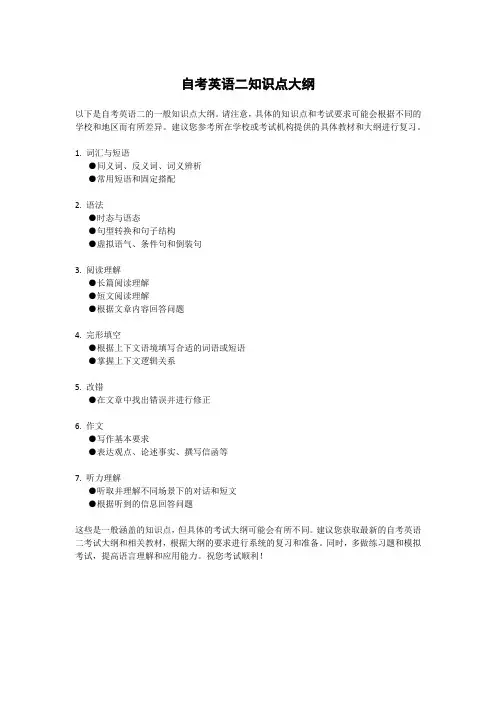
自考英语二知识点大纲
以下是自考英语二的一般知识点大纲。
请注意,具体的知识点和考试要求可能会根据不同的学校和地区而有所差异。
建议您参考所在学校或考试机构提供的具体教材和大纲进行复习。
1. 词汇与短语
●同义词、反义词、词义辨析
●常用短语和固定搭配
2. 语法
●时态与语态
●句型转换和句子结构
●虚拟语气、条件句和倒装句
3. 阅读理解
●长篇阅读理解
●短文阅读理解
●根据文章内容回答问题
4. 完形填空
●根据上下文语境填写合适的词语或短语
●掌握上下文逻辑关系
5. 改错
●在文章中找出错误并进行修正
6. 作文
●写作基本要求
●表达观点、论述事实、撰写信函等
7. 听力理解
●听取并理解不同场景下的对话和短文
●根据听到的信息回答问题
这些是一般涵盖的知识点,但具体的考试大纲可能会有所不同。
建议您获取最新的自考英语二考试大纲和相关教材,根据大纲的要求进行系统的复习和准备。
同时,多做练习题和模拟考试,提高语言理解和应用能力。
祝您考试顺利!。
Unit 6 The Value of MoneyI. New words and expressions New words1. stationery n.文具同音词:stationary2.fare n. 车资;船费;飞机票价3.lump sum n. 一次总付的钱款4.recess n. 课间歇息,5.allocate v. 拨(给);划(给);分派(给)6.overspendv. 花费过多;比(估计的)花得多;超支注意 over- / out-的差别:overeat outeatoverdo outdooversleep outliveoverweight outshine7.opt v. 选择;精选optionoptional8.constraint n. 限制;限制;拘束9.budget v. 慎重花费;把?编入估算10. overindulge v.过多地享受(尤指食品或饮料)11. short-sighted adj.眼光溜浅的;没有远见的12.mentality n. 心态;思想状况;思想方法13.sibling n. 兄;弟;姐;妹14. indulge v. 沉沦,沉浸,沉迷(于?)15.rationing n. 定量配给政策;配给制16.principle n. 观点;(行动、思想的)原因,信条同音词: principal17. unnecessarily adv.没必需地18. differentiate v.划分;差别;鉴别differdifferentdifference19.inculcate v. 频频灌注;谆谆教诲20.resist v. 忍住;抵抗resistance resistant21. temptationn.引诱;迷惑22.scheme n. 计划;方案;系统;系统23.formation n. 构成;形成24. kindergarten n.少儿园25. monthly adj.按月结算的;有效期为一个月的dailyweeklybiweeklymonthlyquarterlyyearlyPhrases and Expressions1. on a daily basis每天地2. result in致使3. pay off付清;偿清4. within one's means量力而行5. stand ? in good stead (需要时)对某人实用,对某人有益II. Text Learning Teaching Children to Spend Pocket MoneyWisely① School-going children need pocket money for food,stationery and bus fares. Parents give pocket money to their children in different ways . Some give a lump sum at the beginning of a month or a week. Others prefer to give pocket money on adaily basis. (1)The way in which pocket money is given affects how money is spent orsaved. (承前启后的句子)On the other hand, the children'sspend ing habitsmay affect how pocket money is given .②(2) Pocket money given on a daily basis is sometimes termed as "foodmoney".Children usually use the pocket money to buy food during recess and also at lunch hour if they have school activities in the afternoon. They learn how tomanage small sums of money. As the money is limited, they have to control theirspending. (承前启后的句子)(3) Some parents choose this method of allocating pocket money in order to prevent their children from overspending , hoping that in time theycan be trusted with larger sums of money.Parents who earn daily wages may also opt for this due to financial constraints.(承上句)本部分要点及难点:1. The way in which pocket money is given affects how money is spent or saved.(1) the way (in which / that) sb. does sth.(参照 Unit 2, Text A)the way (in which / that) sth. is done(2)句子的骨干是: The way affects how money is spent or saved.2.Pocket money given on a daily basis is sometimes termed as"food money".(1) given on a daily basis过去分词短语作定语(2) be termed as被称为?3.Some parents choose this method of allocating pocket money in orderto prevent their children from overspending, hoping that in time they can be trusted with larger sums of money.(1)句子的骨干是Some parents choose this method in order to prevent theirchildren from overspending.prevent sb. from doing sth.与keep sb. from doing sth.同样,但前者from能够省略,后者不可以省略。
自考“英语(二)”复习资料 第一单元1. 常考单词: 3) Some people think that theworld received much media attention earlier this year in several highly publicized cases.4)A Filipino maid was executed Start of Bethlehem could have been a supernova.4) If a man fell into a black goal , objective , accomplish , hole ,he would think that he reached in Singapore after being convicted predict , accompany , implement , tendency , achievement ,argue , budget ,define ,entity2. 常考词组:of murder , despite protests formthe center of it very quickly.5) It is only recently that astronomers have begun specific research into black holes.6)On the other hand ,scientists various quarters that her guilt had not been adequately established.5) She used to work for a very low wage at a tea factory in Sri Lanka.6) Because she found it difficult to feed her four children , she accepted a job working as a domestic in London.in the way ,in part ,point of apply for , view , contribute to ,to have suggested that every advanced in hand , to turn down3. 常考句子:technology could one day make use of the energy of black holes for mankind.第三单元1. 常考单词:weaken deteriorate debate legal request criterion ensure oppose tradition consideration disabled burden vulnerable prohibition sensitive2. 常考词组:1)A decision is a choice made from among alternative courses of action that are available.2)Often managers must make a best guess at what the future will be and try to leave as little as possible to chance.7)So if they do complain ,they risk being deported.第五单元1. 常考单词:Musician ,rhythmic consciousness ,originate instrument , electronic passive , participant2. 常考词组: ,distinct ,readily , thereby , , , 3)If there is no choice , there is no decision to be made.4)For managers every decision to debate on be opposed toto make request, has constraints based on politics for to take procedures , laws , precedents and the like.5)For example , managers sometimes treat problems in an either/or fashion.6)Decision makers must have some way of determining which of into account3. 常考句子: 1) Affected with a seriousdisease , van Wendal was no longer able to speak clearly and he knew there was no hope of recovery and that his condition was rapidly deteriorating.2) Van Wendel's last three months of life before being given to take place to take over to take on stretch in a sense to serve as at a in advance for the sake of3. 常考句子:1) The new music was built out of materials already in existence.and modern , several alternatives is best - that 2) Folk music ,old was popular among college students.is , which contributes the most to the achievement of organizational goals.7)In the larger scheme of, lethal injection by his3) They freely took overa final doctor ,from American were filmed and first shown elements form jazz country music.things ,however ,increased for research to improve theproducts might be more beneficial to the organization.8)Someof these objectives funding on television last year in the Netherlands.3)The programme has since bought by 20 countries and each 4) With records at home listeners imitated these lighting effects as best they could. 第六单元1. 常考单词: , been are the , it starts a time it is shown than others ,but more important nationwide debate on the subject.4)What those people who oppose euthanasia are telling me is that dying people haven't the right.第四单元1. 常考单词: order and degree of importance often vary form person to personefficiency increasingly inst reduc s s and from department 第二单元1. 常考单词: escape , explode to department.all tion witch personnel completion critical expose specific intensity , collapse , demestic statistics cale defective2. 常考词组: shrink ,gravity , measurement , diplomat execute serving minimum exploit convict shelfcampaigndespitebasis ,launch ,convincing , de in that plenty ofin question companion , speculation operate , to make use of many , above all2. 常考句子: ,swallow , , a great3. 常考句子: 1) Most of today's robots are employed in the automotiveindustry ,where they are programmed to take over such jobs as welding and spray painting automobile and truck bodies.status deport2. 常考句子: 1) There are estimated to be 1)Astronomers and scientists more than 20,000 overseas servants working in Britain.2)Of these 20,000,just 2, 000 are being exploited and abused by their employers.domestic think that a black hole is a region of space into which matter has fallen and from which nothing can escape.under 2)Robots ,already taking over 2)The theory is that some stars 3) The sad condition of women working as domestics around thehumantasks in are beginning the automotive field explode when their density to be seen , althoughto a lesser degreeindustries as well., in other 6) For example , the degree to which and the ways in which a school to approximate toresistance toto cope with 3)The robots used in nuclear power plants handle thein games , encourages participation attribute to3. 常考句子: 1) Nation classified as “aged ” w hen they have 7percent more of their people aged 65 or above. ( para.1 )2) The nearer a society approximates to zero population sports and cultural pursuits are,preventing radioactive materials likely to contribute to the shaping human personnel to radiation.from being exposed of leisure the students.attitudes on the part of of 4)Robots 7)Schools differ from automatic usually set as their machines in that after completion educational objective the attainment of a balanced development of the person.8) The more seriously this is sought , the more likely positive attitudes towards leisure as well as academic work will be encouraged.第八单元1. 常考单词: ,they can be of one specific task growth ,the older its likely to be - at leastfuture that concerns us now.reprogrammed by a computer to do another one.5)Engineers skilled in microelectronics and computer technology are developing artificial vision for robots.population , for any is3) The older you are now , of course ,the greater this proportion will be , and greater still if you are a woman.4) If you are now in yourthirties ,you ought to be aware that you can expect to live nearly one6)With the ability to “see ”, robots can identify and inspect one specific class of objects out of a stack of different kinds of materials.flight negotiation transport externa assumpti overcome rhythm promoteinternal feasible third of the rest of your life after 7)Anyone wanting to understand l on the age of 60. 第十单元1. 常考单词: the industry of the future will have to know about robotics.第七单元1. 常考单词:2. 常考词组:effect onto advantage to blame now that on election yalty ategy arters vote decline pursue economy certainty democrat impact stir lo str headqu congre out of step to leave alone3. 常考句子:1)The problem every international across at some time. 2) The effects research elevant attach positive underlie possession r of Jet Lag is one desirable relaxation acquire occu parti traveler comes ss representative(para.1 )常考词组:identifypation cipationurban 2. to of rapid travel as impact 2. 常考词组:be concerned withon the body are actually far more disturbing than we realize. ( para.2 )3) He later blamed his poor on常考句子: be as 3. 1) Candidates relevant to objectiveto set try to project a ( para.4 )strong leadership image. 3. 常考句子:1)People in advanced industrial societies areincreasingly concerned with opportunities for leisure.( para.3 )2) Whether voters accept this image , however , depends more on external factors than on a candidate's personal judgement on Jet Lag. 4) Nowthat we understand what Jet lag is , we can go some way to overcoming it. ( para.4 )5) The other belongs in our ( para. 4 )characteristics. 2)The importance clocks which , l eft alone , 此句注意主语从句作主语。
虚拟语气是把作者想陈述的动作当成一种只存在于讲话人想象中的“假设”或“推测”,而不是当作客观现象中真实事件。
它表达的是怀疑、忧虑、推测、假设、想象或祝愿等。
该语法现象应用在非真实条件中,包括虚拟条件句、推测条件句和错综复杂条件句。
这里所说的非真实条件句,大家便会联想到if这个词,如果我们在句子中看到if引导的条件从句是以动词的过去式作为句子的主要谓语的话,我们就应基本设定它为虚拟语气。
如果句子中出现了wish这个词,我们应该明白要考虚拟了。
Wish如果在句子中表达的是与现在事实相反的结果,如果考系动词,一定要选择were;如果没有系动词,只是一个简单的动词,那么我们要选择它的过去式;第二,如果wish表达的是与过去事实相反的结果,那么我们就用had+过去分词(或would/could+ have+过去分词);如果wish表示的是将来没有把握或不太可能实现的愿望,用would/should(could, might)+动词原形。
看几个例子:I wish she were here.对现在的虚拟,而且出现系动词了,用were.I wish she had taken my advice.从句意了解到,这个动作应该发生在过去,所以虚拟,虚拟应该用动词的过去完成式(当然里面可能会出现被动形式had been done).I wish you would go with us tomorrow.表达的是将来没有有把握实现的愿望,用would+ to的形式。
实战一下:A: You have made some mistakes.B:I wish I____ mistakes every day.A. don’t makeB. haven’t c. wouldn’t have made D. didn’t makeevery day 足以说明对现在的虚拟,应用动词的过去式,选D。
A:What would you wish to do if you were a college student again?B: That’s very hard to say, but I wish I____A. have not studied psychologyB. did study psychologyC. had studied psychologyD. studied psychology句子中出现了were ,说明是对过去的虚拟,应用过去完成式,选C。
1 第一单元知识点的回顾 Text A 1. choose----choice:词型转换经常考,同时注意该词的过去式和过去完成式。 2. ★available:这个词考的频率很高。换句话说,如果在答案中出现了该词,从词义上应该给予其优先考虑。这个词出现的句子中经常会同时出现ticket, food, book等。 3. decide----decision,注意词性上的变化。 4. purpose:这个词一旦出现,它既可以考本词的意思,也可以考后面的谓语动词的形式,记住:凡是出现purpose, aim, objective, plan,dream, goal等有含有目的性的词,后面的谓语动词一定是to do的形式,同时关注这些词是否为复数形式,如果是,谓语动词一定是复数的。 5. achieve----achievement,注意词型上转换。 6. ★in the way:妨碍,挡路,阻碍。区别in a way:从某种程度上。★on the way (to)在去…路上(★on the way home)和by the way:顺便说一句。 7. ★★involve----involvement(in):注意词型转换,词义及介词搭配。 8. ★consider----consideration。注意词型上的转换,同时牢记take into consideration(account),如果单独考本词,后面的动词一定是+ing形式(动名词),但注意主动和被动含义上的区别。 9. make a guess at:注意固定习语的搭配。 10. certain----certainly----★certainty----★★uncertainty:注意词性和词义上的转换。 11. risk:注意后面接ing的动名词形式。 12. sometimes…;at other times…:注意前后句型上的搭配,很有可能在完型里考。 13. range:这个词应该注意经常考的方式,range from…to…,句子中经常会出现price,或地点等波及到范围上的词汇。 14. a number of/the number of:注意区别后面的谓语动词的单、复数。 15. ★(be)based on/upon:注意搭配,完型常考。 16. therefore:学会so的另一种表达方式,说明结果,完型常考(=consequently,本词还需要注意词型转换consequent/consequence)。 17. treat:注意搭配及同义词组,treat…as, see…as, view…as;另外treat the problem=deal with=cope with。 18. ★simplify:注意词根simple,动词化后变成了该词,该词经常考,比如“把演讲的内容、把陈述/问题等简单化”等等,前面一般会出现complex/complicate(复杂的)/difficult/hard to understand。 19. tend to:无论是本词,还是其名词形式tendency,都注意与to形成搭配。 20. ★as well as:注意前后词态上的一致性,完型和一致性经常考。 2
21. ★★contribute to:无论是动词形式,还是名词形式contribution,都代表了“对…贡献”、“促进”,同时注意to为介词,后面一定要用动名词形式。 22. ★depend on/upon:一定注意词组的搭配,同时如果后面出现动词用动名词形式。 23. ★less than----more than:注意两词组含义上差别,同时在句子中很可能出现考查形容词比较级的问题,完型常考。 24. effect(have effect on)----effective----effectively:注意词性方面的转化。 25. be beneficial to: 注意词组含义,同时注意与benefit(from)之间的转化。 26. in part(部分地)----on the part of(就…而言)----★partially:与part有关的考点就这些。 27. When presented with…:注意句型,“当面临着…”,翻译题中常考。 28. person(in person)----personal----personally----personality:注意词性的转化。 29. accept----acceptable----unacceptable:注意词性转换及含义上的反差。 30. ★cause=bring about=result in,导致,引起 31. isolate----isolation,注意搭配,★isolate from隔离,分开。句中可能会出现patient(患者)、人与人之间的隔离或地域方面由于灾难性造成隔离等方面的词汇。 32. point of view:注意词组的完整表达方式。 33. intended-----unintended :注意词性转换及动词搭配(to)。 Text B 1. ★apply for/apply to----application:前者表示申请,经常句中会出现job/position,后者表达“应用”。 2. ★indifference to(indifferent to):对…漠不关心,注意搭配及含义(阅读的问题中经常出现该词,考察大家对作者写作的态度)。 3. speech----speechless,注意含义上的反差,会在word form中考。 4. clarify----clarification:注意词性转化。 5. ★efficient(ly)----inefficient(ly)----efficiency----inefficiency:注意词性转换及词义上的改变,词型转换常考。 6. find oneself doing(done):注意后面动词的形式,主动=ing,被动=ed。 7. in hand:注意词组含义,区别at hand。 8. in case:注意词组含义及在虚拟语气中的用法(从句中使用动词原形)。 9. ★★★like----likely(unlikely)----likelihood:一定要区别开,后两者表示“可能的/可能性”,形成固定搭配be likely to do。unlike----dislike:前者表示“不像”,后者表示“厌恶”。 10. pain----painful:注意词性转换。 11. ★turn down:注意turn与其他介词的搭配。 3
12. on the spot:注意词组含义。 13. as for----as to:都表示“关于,至于”,但as for常用来引出主题的改变,用在句首,含贬义。
第二单元重点内容的回顾 Text A 1. adequate----inadequate:注意词意上的反差。 2. ★escape from:首先注意词组的搭配,其次escape后面需使用动名词,但需要注意主动和被动含义。 3. ★or so:注意词组含义,经常会在完型填空内考,尤其or。 4. explode----explosion:注意词性的变换。 5. dense----density: 注意词性的变换,常与fog, air, population等词连用。 6. so…that…:注意句型上的前后搭配,经常在完型中出现。 7. ★have idea of+n./Ving:“有…想法或主意”,注意前后搭配,完型中常考。 8. in theory:注意词组搭配。 9. behave----behavior:注意词性转换。 10. fall into:注意介词搭配,并关注与fall有关的所有词组。 11. ★It is only recently that…:注意句型,同时注意recently一出现,整个句子中需使用现在完成时。 12. research into:注意词组搭配。 13. ★convince----★convincing----★★convincingly: 注意词性的变换。 14. visible----invisible----vision: 注意词意上的反差。 15. at…rate/speed:注意介词的用法。 16. make(better/best)use of:注意词组含义及搭配。 17. sound like----look like----feel like:注意固定搭配及词组含义。
Text B 1.★make up/make up for:前者是“组成”,后者是“弥补”,该词组常考。 2.keep(from)…doing:注意句型要求用动名词形式。完型和语法中经常考。 3.cloud---cloudless:注意词意上的反差。 4.more or less:注意词组含义,经常在完型和翻译中考查。 5.★as…as:注意中间用形容词和副词的原形。 6.★consist of:注意词组含义,并注意该词组不需要使用被动语态。 7.★color----colorful----colorless----colored;注意词型上的各种变化,在句子中的含义会 4
发生变化。 8.under…circumstances:注意介词搭配,完形常考。 9.make a difference:注意词组含义。 10.It is true to say that…:注意句型,翻译常考。 11.★★the more…,the better…:注意句型及含义,“越…,越…”。完型和词型转换经常考。
第二部分:令人头疼的语法点回顾 作为英语学习者,最头疼的莫过于是英语语法的学习,今天我就动词时态的问题做部分详细的回顾。 1、现在时:经常考察真实条件/时间状语从句用现在时代替将来的用法,就是说从句中必须用现在时来表示,而主句用将来时表示。需要注意的另一点:现在时还表示普遍真理和事实,如水开的温度、科学现象,社会现象等。 2、过去时:句子中必须出现明显的说明“过去”的时间状语,如ago, at that time, then等。在使用时注意动词过去式的变化,尤其在被动情况下。 3、★★现在完成时:表示到现在为止已经完成的行为或已经终止的状态或一直持续到现在的行为或状态。强调对现在已经有一定的影响或结果(already, lately, rarely, recently, for the past years, so far, since, for a long time, up till now…)。做题目时问问自己,动作完事儿了吗?完事了,用完成,小心被动。 试试:(1)He several books on computer in the past few years. A. has translated B. translated C. had translated D. was translating 解析:看见什么了?选A。现在完成时 (2)Since the Great Depression of 1929, most countries .现在完成时 A. has making a successful recovery B. had made a successful recovery C. has made a successful recovery D. have made a successful recovery 解析:看见嘛啦?选吧,D。 需要注意两个句型:公式1:It(This)is (will be) the first(last, second…)time that…,that后面一定要用现在完成时have done表示。公式2:It is the best(worst, most interesting)+名词+that…,that后面一定要用现在完成时表示。 试试:1、You will hardly believe it, but this is the third time tonight someone me. A. telephoned B. has telephoned C. telephones D. should telephone